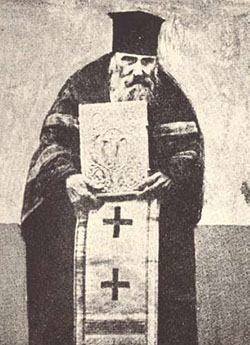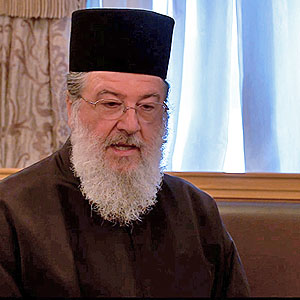The Church without Saints isn’t the Church – 4
31 October 2015I would like to express my warmest thanks to Archimandrite Ieronymos Nikolopoulos, Chief Secretary to the Holy Synod and Parish Priest of this church, for his kind invitation to address you during Vespers on this most important day for the Orthodox Church, which is also of great significance for this parish, since it honors the memory of one of its former priests, Saint Nikolaos Planas.
***
Allow me to mention, with all due reverence, two other personal features of Saint Nikolaos Planas. One was his simplicity. Even people who knew him well – and loved him – probably thought him naïve, because we know of many instances when he appeared so. But Papa-Nikolas had simplicity in Christ, which is a gift. A gift of God to his inner purity. A gift of God to the guilelessness of his heart, to the humbleness of his thought, to the purity of his intentions and to the extreme innocence of his soul. Holy simplicity can’t be judged in terms of reason, because it transcends logicality. It’s unable to produce a bad thought, to be cunning. We read in the Lives of the Saints that this blessing has worked very many miracles. And since we suffer from a lack of it, we don’t work miracles.

Saint Nicholas Planas
Our minds are permanently locked onto bad thoughts, so we’re never at peace with ourselves. It’s important for us to remember that holy simplicity, in its first form, was the charismatic raiment of Adam and Eve, by reason of which they had no sense of shame. This is why the hymnographer who wrote the doxastiko for Vespers in Cheese-week, which presents Adam sitting weeping outside paradise after the expulsion, uses this phrase to express his lament: ‘Woe is me, who was naked in simplicity and now I wonder at it’.
On the Sunday of Orthodoxy we heard in the Gospel reading about the call of the first Apostles. Among them was Nathaniel, who was taken to Christ by his friend Philip. It’s worth noting Christ’s comment about Nathaniel, as He saw him approaching. This comment is most apposite as regards Saint Nikolaos, too: ‘Behold, a true Israelite in whom there is no guile’. Because He can read hearts, He saw the holy simplicity of Nathaniel.
The second of these personal features was his intense liturgical life. He was quite unique as regards this holy feature compared to all the other priests who served the Church outside monasteries. At least so far, there’s been no-one like him. He served the liturgy on a daily basis, often held vigils, his liturgies lasted for hours and he’d remember so many thousands of names.
How many of the living were blessed by God because of him and how many of the departed owed their rest to him.
And from receiving Holy Communion so often how much sanctifying grace his pure soul received, as did his body which had been cleansed by abstemiousness and diligence.
The holy altar was his joy, his spiritual nourishment, his very breath. And it must be remarked here that Papa-Nikolas’ intense sacramental life, his daily liturgies, and particularly his Athonite-style vigils were something of a nuisance for the religious life of Athens at the time. The return to the Fathers still hadn’t occurred and there was no pro-monastic spirit, religious activity being still under the influence of the West. As against this, Father Nikolaos and the core of his spiritual children kept and acknowledged Orthodox tradition. His work was pioneering in terms of the return to the Fathers and to a pro-monastic spirit. All of this blessed work took place within the framework of folk piety, which is the mystical conscience of the Church. This devotion of ordinary people is the womb of the saints who emerge in the Church and is also the secret garden of the saints hidden in the world. It feeds the monasteries with dedicated souls, it provides staff for missions, it maintains churches and the charity work of the Church, it encourages volunteer activity for the glory of God and of His Church, it is where manifestations of the saints take place, it experiences miracles, small and great, and defends the Church when it’s persecuted. The devotion of ordinary people responds to the call of the Church in whatever struggles it’s undertaking, it embodies the spirit of the love of the saints, that is, people read the Lives of the Saints, honor their memory, venerate the icons and the holy relics. The natural protector of this popular devotion is Saint Nikolaos Planas, the protector of ordinary, humble, unassuming but struggling Christians. But he’s also the protector and mentor of those priests who have great love for their priesthood and serve the holy altar with humility, simplicity and a clear conscience. My prayer is that this parish and each of you personally will be under the paternal protection of the celestial prayers of the sanctified priest Nikolaos Planas. Amen!
* Talk given in the church of Saint John the Baptist (Kinigos) in Vouliagmeni Street, Athens, on 1/3/2015 at Vespers on the Sunday of Orthodoxy, the eve of the Feast of Saint Nikolaos Planas.







